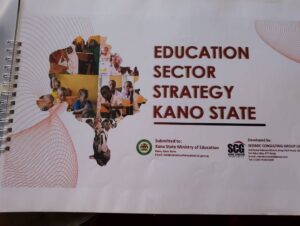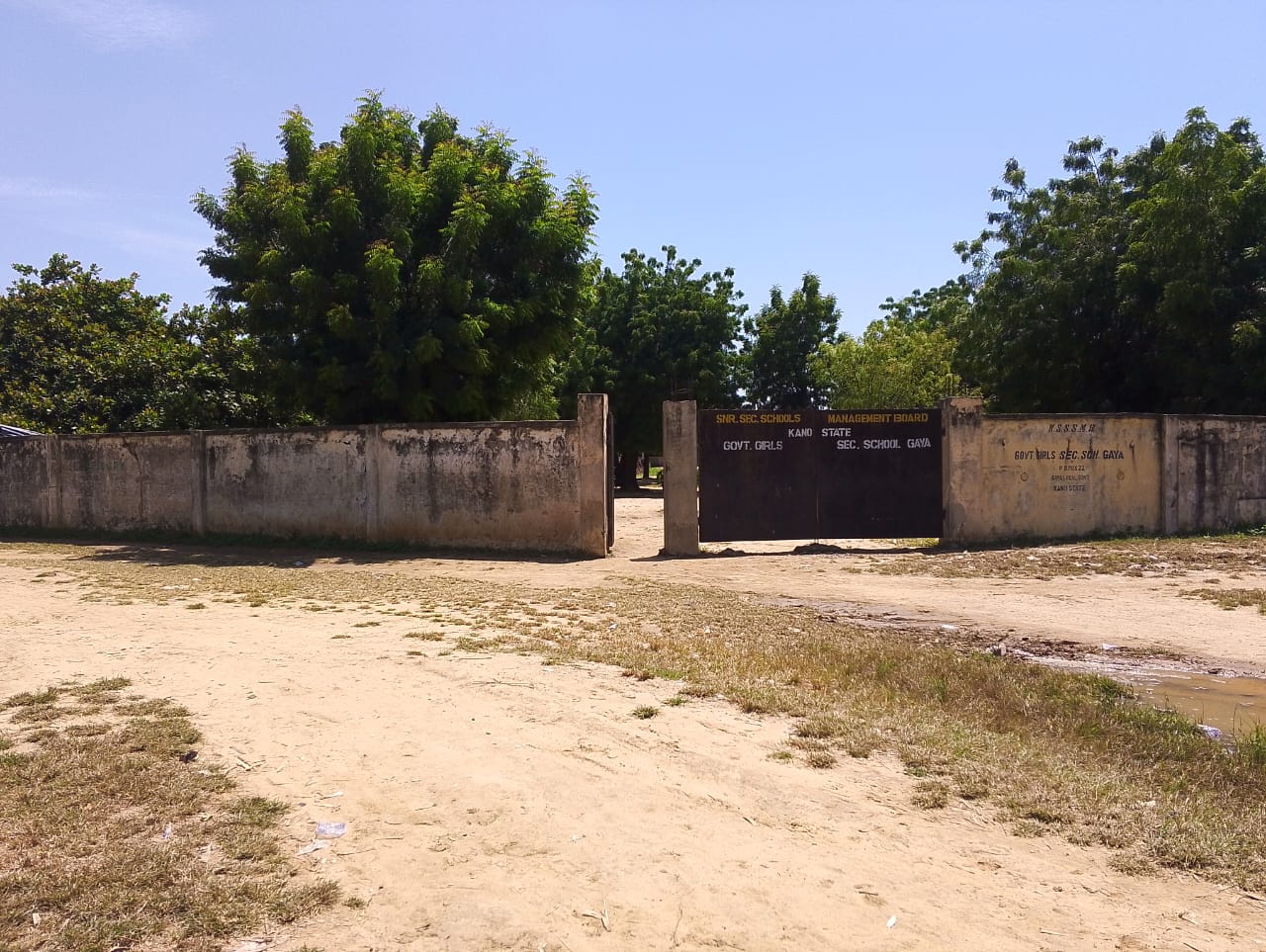By Hadiza Musa Yusuf
Nearly a million children are out-of-school in Kano due to inadequate funding, infrastructure, teacher shortages and other social norms. This is disproportionately impacting vulnerable girls, hence highlighting the gender disparity in accessing education in the state. While female teachers provide significant role models for the girls to enroll and complete their studies, the inadequate of female teachers is indirectly linked to low level of girls enrolment in rural secondary schools in the state. However, to close this gap, Hadiza Musa Yusuf reports that advocates are pushing to mainstream a gender-responsive methodology in the state’s Education Sector Plan (ESP).
Seventeen-year-old UmmulSalama’s eyes follow the lone female teacher passing through the hallway—a rare sight at Government Girls Secondary School (GGSS) Gaya. She watches as the teacher disappears into the distance, feeling the weight of unasked questions pressing on her mind, questions that need a woman’s understanding. With no one to ask and nowhere to turn, she pushes them aside.
“It’s not that we don’t have good teachers,” UmmulSalama says quietly. “I just wish we had more female teachers. It would feel different, like they’d understand us more. There are things I’d like to ask—like asking for a pad or seeking personal advice and guidance, but I can’t. The one female teacher we have doesn’t come regularly, and the principal’s office is usually busy. She’s hardly ever alone,” she added.
“There are times when I really want to speak up, but I stop myself. I feel shy and awkward, especially during biology. I feel that a male teacher wouldn’t understand.”
For Aisha, a 14-year-old girl in JSS3 Kogo Government Junior Secondary School co-exist, a coeducational institution in Kiru L.G.A where she’s surrounded mostly by boys and taught entirely by male teachers, each day brings a wave of unease, a discomfort that’s hard to ignore but harder still to explain.
In many ways, the quiet, thoughtful Aisha likes her school. But without a single female teacher, she often feels out of place.
“I wish we had a woman teacher here, someone who’s been through some of the same things we’re going through. It would make things a lot easier. Someone we could see as a mentor,” she says.
UmmulSalama and Aisha’s stories mirror the experiences of thousands of girls across Kano State, whose education is hindered by a lack of gender-responsive support. The absence of female teachers leaves students like them with unanswered questions and an unmet need for guidance and support, quietly dismissed in a system unequipped to address it.
Kano, despite its free education policy aimed at increasing school enrollment, retention, and completion, has yet to adapt to the growing needs of students, particularly young girls.
According to UNICEF, nearly one million children in the state are out of school, representing more than 10% of Nigeria’s 18.5 million out-of-school children which 60% are girls. Although Kano’s free education policy was meant to open doors, outdated education policies have left students struggling to keep up.
The Gender-Responsive Education Sector Plan (GRESP) is emerging as a crucial framework to address the gender-specific challenges that prevent thousands of children from accessing quality education, especially in rural areas. GRESP’s approach focuses on creating an inclusive, equitable education system. However, it has yet to be adopted, as Kano still operates with the outdated 2009-2018 Education Sector Plan (ESP), which defines the state’s educational policy.
Jamilu Abdullahi, Vice Principal of Government Girls Secondary School (GGSS) Gaya, shared concerns about the impact of gender disparities among teaching staff on the quality of education for female students.
The school, established in 1993, currently enrolls 920 female students, many of whom travel from remote areas, such as Balari, Ajingi, and Bangashe, with the farthest being 13.8 kilometers away.
Abdullahi explained, “Our school has a total of 22 teachers, with 16 provided by the Kano State Senior Secondary Management Board (KSSMB) and five volunteers.”
He added, however, that there is a significant gender imbalance: only one of these teachers is a woman, aside from the female principal.
“The lack of female teachers is a real challenge,” Abdullahi noted. “Female students need women they can turn to for advice, support, and understanding, especially on sensitive issues.”
The lack of female teachers highlights an area for improvement, particularly given the 2017-2020 Strategic Plan by the Universal Basic Education Commission (UBEC), which emphasizes strategies to increase female representation among teachers in rural and underserved areas.
Abdullahi acknowledged that GGSS Gaya still has a way to go in meeting the goals for gender equity and support.
Female teachers make up less than 30% of workforce in Kano
Recent data from the Kano State Universal Basic Education Board (SUBEB), revealed that a significant gender disparity exists among teachers in both primary and junior secondary schools across the state.
According to the data, female teachers make up less than 30% of the teaching workforce in the state’s primary and junior secondary schools.
In primary schools, which cover grades 1 through 6, there are a total of 40,541 teachers. Of these, 28,561 are male, while only 11,980 are female. This means male teachers make up nearly three-quarters of the primary school teaching workforce.
The imbalance becomes even more pronounced in junior secondary schools, where the total number of teachers stands at 7,947. Out of this figure, 6,209 are male, leaving only 1,738 female teachers, resulting in a ratio of roughly four male teachers for every female teacher.
KSSMB ED calls for strategic recruitment to address teaching gaps
Dr. Kabiru Ado Zakirai, Executive Director of the Kano State Senior Secondary Management Board (KSSMB), has called for urgent action on expanding teacher recruitment and training, especially for female teachers, to address the shortage across Kano’s secondary schools.
According to him, currently the senior secondary schools accross the state has about 13,000 teachers.
“About 2,500 are still under going screening and they are yet to be posted to different schools but there is still a deficit.”
He highlighted significant gaps, estimating a shortage of over 5,200 teachers in the senior secondary schools across the state, particularly in science subjects (2,700) and entrepreneurship (1,500).
Dr. Zakirai emphasized that while recent recruitment efforts by Kano State Governor Abba Kabir Yusuf are helping, a wave of teacher retirements expected by December will reduce the workforce by approximately 3,000, bringing the total down to around 10,000 teachers for seniors secondary schools across the state.
He stressed that there is a need for additional recruitment and structured teacher training programs.
He further emphasized the need for purposeful, functional, and inclusive planning” to address these issues effectively.
5,643 teachers recruited, over half are women
Kano State’s Commissioner of Education, Alhassan Doguwa, announced that Governor Abba Kabir Yusuf oversaw the recruitment of 5,643 teachers earlier this year with the majority being women.
He noted that this is to address gender imbalances in schools.
He emphasized the state’s commitment to closing gender gaps in education through targeted recruitment and other initiatives that support Gender-Responsive Education Sector Planning (GRESP).
The commissioner attributed the decline in the state’s education sector to neglect by the previous administration under Umar Abdullahi Ganduje.
According to Doguwa, the education system has been deteriorating steadily since 2015.
He explained that this neglect has pushed many young girls back into the streets due to limited schooling options.
In response, the current administration is actively working to reverse these issues. “We have refurbished 72 school buses, 57 of which are operational, to provide safer, easier access to education for young girls,” Doguwa said.
He added that the administration has also committed to providing free uniforms and has doubled the previous budget for school feeding programs, ensuring that quality standards have reached 100 percent.
Furthermore, the administration has revived the Conditional Cash Transfer (CCT) project, an initiative aimed at reducing hawking among young girls.
“Through this initiative, 48,500 girls received ATM cards, and 20,000 were given N20,000 each to help them stay in school,” he explained. The project is supported by the World Bank and the state-backed AGILE project.
In partnership with international organizations, and other Non Governmental Organizations (NGOs), the state government is reviewing outdated laws, such as the 1964 education law.
Other policies, including the Kano Teacher Development Policy, are also under review and will be released soon.
Doguwa assured that these policies will improve the appeal of public schools and deal with teacher’s recruitment and all GRESP related issues.
Doguwa criticized the previous administration’s development plan from 2020, suggesting it lacked actionable follow-through.
“When the previous administration developed a plan, what did they do? They just wrote what they wanted and drank tea,” he commented. “We have a plan, and we intend to see it through.”
The Ministry of Education, he added, is now guided by an “Education Sector Strategy” that offers comprehensive solutions for the challenges in Kano’s education system. The strategy focuses on themes such as Educational Access, Quality, Infrastructure and Facilities, Governance and Funding, Equity and Inclusion, and Technical and Vocational Education and Training (TVET).”

Education Sector Strategy Plan
Also, Governor Abba Kabir Yusuf confirmed the introduction of several key policies during his presentation of the 2025 appropriation bill before the state assembly on Friday, 8th November, 2024.
He emphasized the government’s commitment to solidifying the sector with well-structured policies and laws.
“The government has taken a deliberate step to ensure the education sector is underpinned by robust policies and legal frameworks,” Governor Yusuf stated.
“To this end, six draft policies have been submitted by the Ministry of Education, including the Kano Education Law, 2024; Kano Teacher Development Policy; Kano Non-State Actor Policy; Kano State Early Childhood Care and Development (ECCD) Policy; and Kano State Girl-Child Education Policy.”
Kano lacks policy framework for gender considerations – Expert
Abdulazeez Musa, Director of Programs at Bridge Connect Africa Initiative (BCAI) has revealed that while a gender policy is currently under review in Kano State, there is currently no structured policy framework that guides gender considerations and integration in the education sector’s planning and budgeting processes.
“The concept of GRESP (Gender-Responsive Education Sector Planning) is still relatively new and needs to be systematically integrated into the state’s education planning and budgeting,” Musa explained.
“Currently, there are gaps in how educational resources are allocated and monitored to address the distinct needs of girls, especially those facing socio-economic and cultural barriers.”
Musa emphasized that while the government has demonstrated a commitment to expanding access to education, GRESP requires a focused approach.
“This approach must prioritize resources in areas such as safe school infrastructure, scholarships, teacher’s recruitment and a gender-sensitive curriculum,” he added.
“We need an updated sector plan that not only allocates resources but ensures they reach the areas where they are most needed.”
Musa called for an updated education sector plan aligned with GRESP principles, one that goes beyond merely addressing gender gaps. “Such a plan would create a foundation for inclusive, equitable, and sustainable growth in education,” he argued.
A key recommendation from Musa was the integration of gender-disaggregated data collection into the budgeting process.
“This will provide clear, evidence-based justifications for gender-sensitive allocations,” he added.
Musa also highlighted the need for stronger partnerships with development agencies and corporate social responsibility (CSR) initiatives to supplement state funding.
“Kano has an opportunity to lead in gender-responsive education by updating its sector plan to meet both national and international commitments to gender equity,” he concluded.
To help girls like UmmulSalama and Aisha thrive, the government and stakeholders must update education policies, adopting approaches like GRESP to address their unique needs.


